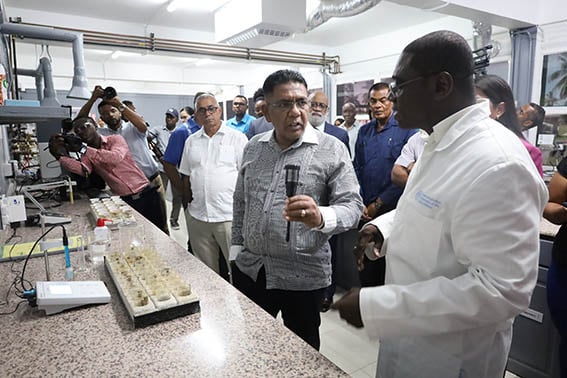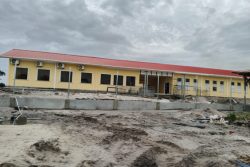Minister of Agriculture, Zulfikar Mustapha yesterday commissioned a $100 million Soil Chemical Services Laboratory at the National Agricultural Research and Extension institute (NAREI) at Mon Repos, East Coast Demerara.
It is aimed at modernizing soil testing and related services for farmers.
Speaking at the commissioning event, Mustapha emphasised that the aim is to see Guyana becoming even more modernized.
“It is very important for us to develop this sector because the agriculture sector when we look at it, it is only a subset of the entire sector and the goal is food security. Today we are more recognized around the Caribbean in the agriculture sector and by modernizing the sector, we can also achieve our goal of once again becoming the bread basket of the Caribbean. We will use all the revenue needed to assist in modernizing the agri sector”, the Minister added.

An estimated $57m was spent to enhance the facility, with some $29.6m going to equipment. The new tools will enable Guyana to chart the way in agriculture.
Officers working in outer regions will also benefit from the soil chemistry laboratory, as tablets will be distributed to each regional officer in Region 9 and other regions to allow testing information to be sent in a timely manner.
Also addressing the gathering, Chief Executive Officer of NAREI, Jagnarine Singh noted that ‘’This enhanced soil chemistry laboratory is well on its way in becoming one of the state-of-the-art facilities in the country. NAREI plays a critical role in enhancing the agriculture sector and is the corner stone of Guyana’s Agriculture development.’’
Singh, emphasised NAREI’s commitment in supporting the government across all sectors of agriculture in Guyana. He highlighted NAREI’s role in providing farmers with the necessary guidance and training in their specific fields of cultivation, aiming to improve production and understanding. Additionally, more programmes for officers’ skills enhancement will be implemented.
Some soil chemical services offered at the laboratory include determination of pH and Electrical conductivity (EC) (soluble salt conc. In soil), one-day recommendations for limestone, fertilizer and organic matter made based on soil analyses and the distribution of results, reporting analysis results and recommendations to clients via telephone and/or WhatsApp.
The lab will also support ongoing research efforts, serving as a hub for innovation in soil science and helping to guide sustainable farming practices.
During a recent visit to Berbice, farmers complained to Mustapha about NAREI’s services.
One farmer said that a sample of his soil was sent for testing by NAREI since last year and he was yet to receive results.
Mustapha questioned the NAREI officer who was present at the location and was told that the sample was indeed sent for testing but no results came back. It is unclear whether the officer had made any efforts to follow up the testing.
Mustapha then stated, “I am very dissatisfied how NAREI has been performing in this part of the region. If the officers are saying that they sent down information, we have the man in charge of NAREI here, we will have some meetings and I will deal with these issues.”
Stressing that NAREI is in place to assist farmers countrywide, the minister said, “they have to be more responsive, they have to, and I want to tell you that the President (Irfaan Ali) himself is very passionate about agriculture because we see agriculture as one of the most important sectors, if not the most important sector.”
He pointed to the COVID-19 pandemic during which he said that countries around the world had difficulties sourcing food for their population despite having large financial resources, “there was just a downturn in production and people were just producing for themselves. In Guyana we are producing 60% of the food but we want to increase that production and we want to go into new crops.”
Meanwhile, at the Bushlot location, one farmer, Leslie, who has his farms at Friendship Village, explained that his bora, okra and some other plants were affected by an unknown disease. “I am not getting any solution for this disease…”
Another farmer, Richard Budhu, of Number 51 Village, Corentyne, told the minister that as soon as his tomato plants are about to bear the flowers start to fall off and the plants then suddenly die. He relayed that he has tried to spray the plants multiple times but the same still happens.
Mustapha then said, “If we continue like this, we can’t”, pointing out that the Ministry of Agriculture’s budget has increased with NAREI “getting a large sum of money, we buying a lot of resources for NAREI.”









